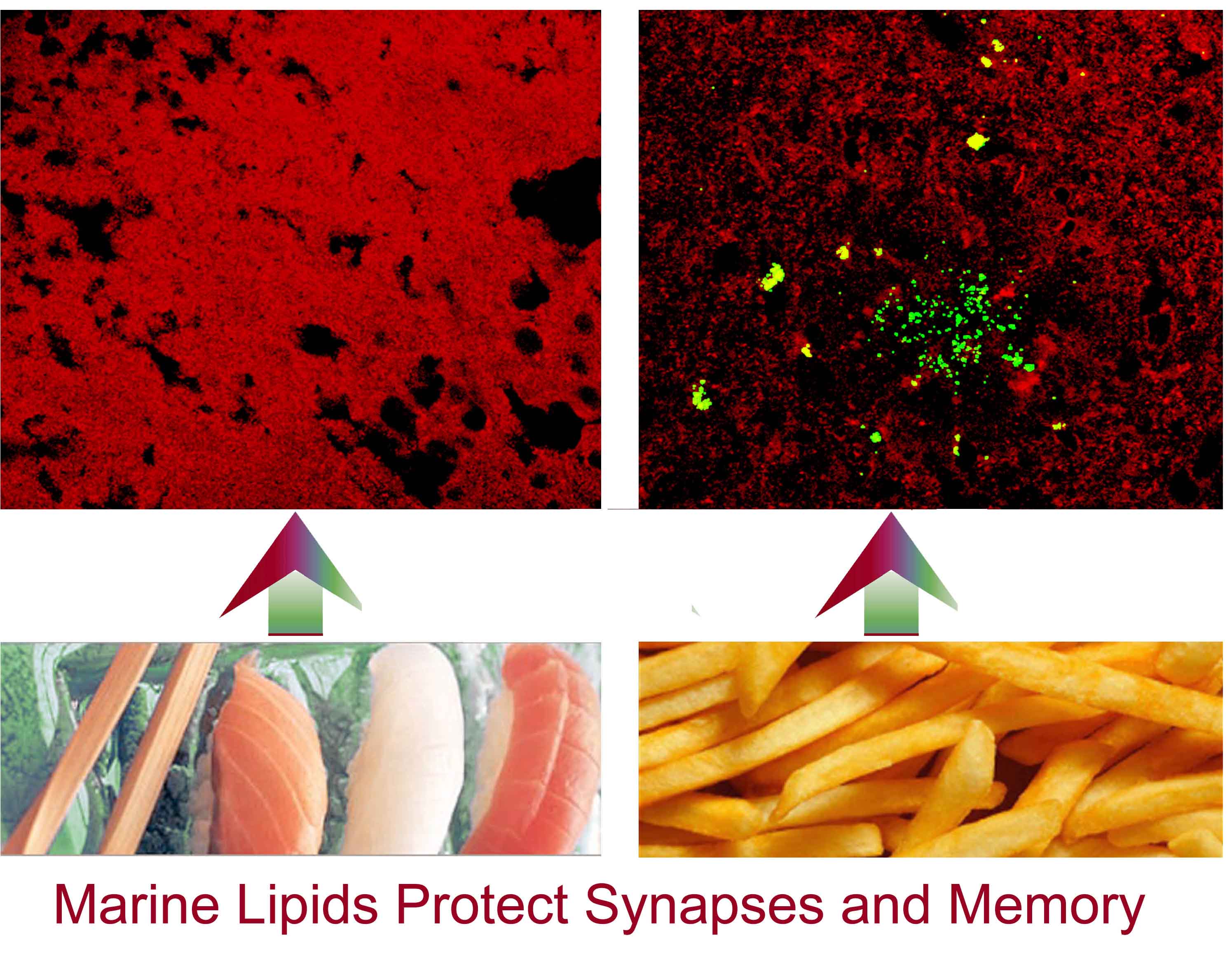 Brains after depletion of the omega 3 fatty acid DHA from the diet of Alzheimer models.. The left panels shows that on a diet rich in omega 3 (the Japanese Diet), brain is rich with connections between nerve cells (red) and has few plaques (green). while teh righ panel shows that on a diet depleted of DHA (eg typical American Diet), connections between cells are lost (red) and there are more plaques (green)
Brains after depletion of the omega 3 fatty acid DHA from the diet of Alzheimer models.. The left panels shows that on a diet rich in omega 3 (the Japanese Diet), brain is rich with connections between nerve cells (red) and has few plaques (green). while teh righ panel shows that on a diet depleted of DHA (eg typical American Diet), connections between cells are lost (red) and there are more plaques (green)
Omega-3 Fatty Acids
Essential fatty acids are fatty acids that the body cannot make it from other sources and must be obtained from the diet. They include two polyunsaturated fatty acids- linoleic acid (LA) and linolenic acid (LNA). These PUFAs are the precursors to other n-6 and n-3 fatty acids, namely arachidonic acid and docosahexaenoic acid or DHA. DHA is most prevalent in marine fish and algae than freshwater species and there is also some DHA in egg yolks. The fatty acid has anti-inflammatory and anti-oxidant characteristics and is currently being studied as an anti-cancer agent.
What do we know about DHA and the brain? Years of research have shown that DHA is the most abundant fatty acid in the brain and is critical to fetal and infant brain development. It is also crucial in maintaining vision and normal brain function.
Low blood and brain levels of DHA have been linked to cognitive impairment and may increase oxidative stress in the brains of AD patients. Several epidemiological studies of Japanese, Western, and Scandanavian populations show a protective effect against Alzheimer’s disease when people ate more fish. Thus, it seems that diets high in DHA may be beneficial in reducing the risk for AD, but it is unclear how DHA impacts AD pathogenesis and whether it is the preventive dietary factor in fish oil.
Our lab wanted to evaluate the effects of feeding DHA-depleted and DHA-enriched diets to Alzheimer mice. Mice on DHA-depleted diets suffered from cognitive impairments and severe loss of synapse proteins, with some losses reaching 90%. Feeding extra DHA to these mice protected against the synapse protein loss and prevented the cognitive deficits. There were also 40 to 50% fewer plaques and up to 70% less b-amyloid, the protein that makes up these plaques. (insert your fluorescent photos already on website.
Determining an effective DHA dose for prevention of Alzheimer’s disease can only be determined through clinical trials. Currently, the safety and tolerability of omega-3 fatty acids (4 gm/day) in mild to moderate AD patients is being tested in Sweden while two double-blind, placebo-controlled clinical studies are underway to evaluate whether omega-3 fatty acids are effective in treating mild AD patients (Oregon Health and Science University and University of Guelph, Canada).
Docosahexanoic acid (webpage still in progress)
A recent government report suggested for the need for increased attention to omega 3 fatty acid depletion in the American Diet. RAND
- 1.Calon F, Lim GP, Morihara T, Yang F, Ubeda O, Salem N Jr, Frautschy SA, Cole GM. Dietary n-3 polyunsaturated fatty acid depletion activates caspases and decreases NMDA receptors in the brain of a transgenic mouse model of Alzheimer's disease. Eur J Neurosci. 2005 Aug;22(3):617-26.PMID: 16101743 [PubMed - in process]
-
2: Lim GP, Calon F, Morihara T, Yang F, Teter B, Ubeda O, Salem N Jr, Frautschy SA, Cole GM. A diet enriched with the omega-3 fatty acid docosahexaenoic acid reduces amyloid burden in an aged Alzheimer mouse model.J Neurosci. 2005 Mar 23;25(12):3032-40.PMID: 15788759 [PubMed - in process]
-
3: Calon F, Lim GP, Yang F, Morihara T, Teter B, Ubeda O, Rostaing P, Triller A, Salem N Jr, Ashe KH, Frautschy SA, Cole GM. Docosahexaenoic acid protects from dendritic pathology in an Alzheimer's disease mouse model.
Neuron. 2004 Sep 2;43(5):633-45.PMID: 15339646 [PubMed - indexed for MEDLINE]